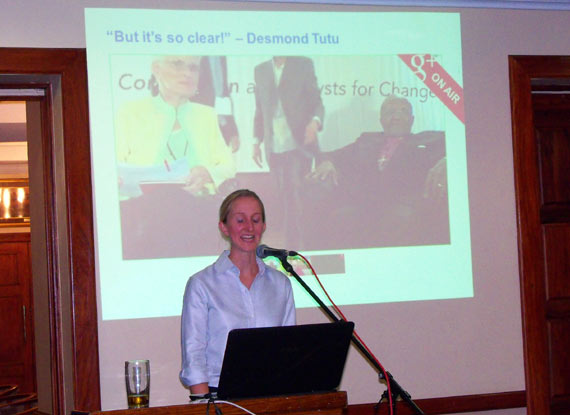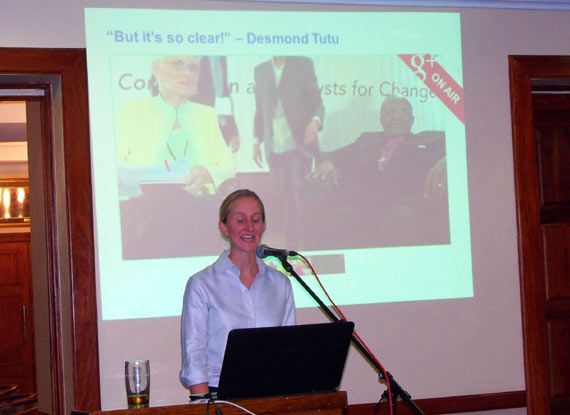 Two days ago we had the opportunity to attend an event organised by Deloitte Consulting in Harare called “The List”. It’s basically a monthly networking event whose purpose is to link the future leaders of Zimbabwe’s top 100 local and international organisations. Usually, there’s a high profile Zimbabwean business person speaking at these events. Business people like Shingai Mutasa, CEO of Masawara and Nathan Kalumbu, the President of Coca-Cola for Central, East and West Africa have spoken at these events.
Two days ago we had the opportunity to attend an event organised by Deloitte Consulting in Harare called “The List”. It’s basically a monthly networking event whose purpose is to link the future leaders of Zimbabwe’s top 100 local and international organisations. Usually, there’s a high profile Zimbabwean business person speaking at these events. Business people like Shingai Mutasa, CEO of Masawara and Nathan Kalumbu, the President of Coca-Cola for Central, East and West Africa have spoken at these events.
Anyway, yesterday Deloitte had Julie Taylor, Google’s Head of Communications and Public Affairs for sub Saharan Africa speaking about Google’s strategy in Africa and the products the Internet search giant has launched on the continent. The event yesterday was sponsored by Gikko.net, a startup we’ve written about here before.
Taylor spoke briefly about the growth of access to the internet and mobile phones. She gave some stats from Canalys on smartphone growth on the continent revealing that year on year, the increase in the number of smartphones for 2011 was 101.9% in Africa, compared to 15% in Western Europe and 61 % in the Middle East. Smartphones, according to the stats she presented, now make up just under 11% of all mobile phones on the continent.
In terms of Google’s strategy on the continent, Taylor said it’s divided into 3 parts; access, relevance and sustainability. “Access is about getting people online, and once people are online we want the Internet to be relevant and useful to them,” she explained. “In the long term it needs to be sustainable without the Googles and all the tech companies; it needs to move and grow on its own.”
In the QnA segment of her presentation, Taylor was asked about Google’s recent changes to its privacy policy. These changes have stirred quite a reaction globally including a Europe-wide inquiry. Her response was that it was more about simplifying the company’s privacy policies which previously included over 60 separate agreements, one for each product. She also said Google uses people’s search history to provide more relevant search results to users across Google services, but that personal information is still protected, and no information is passed onto third parties.
Another question she took was one on how much of a run for their money Facebook had caused Google on the continent, to which she replied: “Facebook is very popular across the continent and it has highlighted how important the concept of “social” is to people whether it’s in Nigeria or Uganda, or Senegal or here in Zim. Social connections to people are incredibly important. In terms of competition, we encourage competition. We think it’s good for the Internet. The more competition there is, the more innovation there is.”
Recently, Google announced that they were enabling Google+ profiles on Google Trader, its classifieds platform for Africa currently operational in Uganda, Ghana and Kenya.

16 comments
ok. so y’all host Google in Zim and forget to notify us about it. nice.
When is Google going to launch services like Streetview, you-tube in Zimbabwe. in fact, when will our developers have a G-Day so they can also help contribute content and build businesses online?
From my shallow understanding you can contribute to Google maps if you want, matter of fact is do you have the infrastructure to make it “relevant” I guess.
No, your understanding is not shallow. Very few software developers care much about GIS and thats bad. Next to internet, GIS is going to explode. Dust your mapping knowledge now all you geeks! Started this call in 2005 and have seen GIS slowly coming on. NGO’s are on it. Nex its Gov. Just done a Goat Marketing GIS for rural folks in gwanda and Beitbridge and an Agro-dealer prototype for NGo in food security. Used VB.Net, mySql and MapWindowsGIS. Not for mobiles hahaha!
Cool include me in your beta list.
Thanks
Most of the stuff I do is commisioned by clients and there is no requirement for beta testing. Just completed a dms for public use but did not think about creating community of beta testers. Thanks for the idea, its smart and in future I will have to include it, and you, in my plan of things
I know this is late, but it sounds like you might be interested in OpenStreetMaps.org – Google’s GIS data belongs to Google: with OSM, you can download the data & do whatever you want with it (roads, delimited areas, POIs, everything). OSM data can also be imported into PostGIS (Postgres + GIS extension). PostGIS is awesome, by the way.
Was at this event. She said Google has no plans for Zimbabwe in the ‘near future’. She just hope there will be something.
I wouldnt see any much profit in investing in Zim’s online space. Its not at all a Market speaking in google terms.
Was I there I was going to sak why google is “doing evi”l by working with a US law that says if you are an author and have not objected to them loading your book on google, then they can pretty much scan it and make it available without asking you because you did no respond to the US law call for you to object by whatever date they have set (and the date has passed by the way!!).
Did any bother to ask her how we Zimbabweans can get access to buying apps off android market without the use of a credit card?
Actually on that one you can simply ask me 🙂 .
Why cant you buy anything from Zimbabwe with a Credit card?
“Why cant you buy anything from Zimbabwe with a Credit card?”